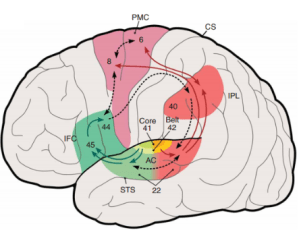Excerpt From: Sapolsky (2004). Why Zebras Don’t Get Ulcers
Of all the hormones that inhibit the reproductive system during stress, prolactin is probably the most interesting. It is extremely powerful and versatile; if you don’t want to ovulate, this is the hormone to have lots of in your bloodstream. It not only plays a major role in the suppression of reproduction during stress and exercise, but it also is the main reason that breastfeeding is such an effective form of contraception. Oh, you are shaking your head smugly at the ignorance of this author with that Y chromosome; that’s an old wives’ tale; nursing isn’t an effective contraceptive. On the contrary, nursing works fabulously . It probably prevents more pregnancies than any other type of contraception (Djerassi 1979). All you have to do is do it right.
Breast feeding causes prolactin secretion. There is a reflex loop that goes straight from the nipples to the hypothalamus. If there is nipple stimulation for any reason (in males as well as females), the hypothalamus signals the pituitary to secrete prolactin. And as we now know, prolactin in sufficient quantities causes reproduction to cease.
The problem with nursing as a contraceptive is how it is done in Western societies. During the six months or so that she breast-feeds, the average mother in the West allows perhaps half a dozen periods of nursing a day, each for 30 to 60 minutes. Each time she nurses, prolactin levels go up in the bloodstream within seconds, and at the end of the feeding, prolactin settles back to pre-nursing levels fairly quickly. This most likely produces a scalloping sort of pattern in prolactin release.
This is not how most women on earth nurse (Konner & Worthman 1980). When a hunter-gatherer woman gives birth, she begins to breast-feed her child for a minute or two approximately every fifteen minutes. Around the clock. For the next three years. (Suddenly this doesn’t seem like such a hot idea after all, does it?) The young child is carried in a sling on the mother’s hip so he can nurse easily and frequently. At night, he sleeps near his mother and will nurse every so often without even waking her.
Consider the life history of a hunter-gatherer woman. She reaches puberty at about age thirteen or fourteen (a bit later than in our society). Soon she is pregnant. She nurses for three years, weans her child, has a few menstrual cycles, becomes pregnant again, and repeats the pattern until she reaches menopause. Think about it: over the course of her life span, she has perhaps two dozen periods. Contrast that with modern Western women, who typically experience hundreds of periods over their lifetime. Huge difference. The hunter-gatherer pattern, the one that has occurred throughout most of human history, is what you see in nonhuman primates.
Perhaps some of the gynecological diseases that plague modern westernized women have something to do with this activation of a major piece of physiological machinery hundreds of times when it may have evolved to be used only twenty times (MacDonald et al 1991). An example of this is probably endometriosis (having uterine lining thickening and sloughing off in places in the pelvis and abdominal wall where it doesn’t belong), which is more common among women with fewer pregnancies and who start at a later age. Remarkably, the same is now being reported in zoo animals who, because of the circumstances of their captivity, reproduce far less often than those in the wild (Vogel 2001).
References
- Djerassi (1979). The politics of contraception
- Konner & Worthman (1980). Nursing frequency, gonadal function, and birth spacing among !Kung hunter-gatherers
- MacDonald et al (1991). Recurrent secretion of progesterone in large amounts: an endocrine/metabolic disorder unique to young women?
- Vogel (2001). A fertile mind on wildlife conservation’s front lines

Do you have any inkling about the cause of the spread of the old wives’ tale? I don’t think it was familiar to me when I first read this post.
I often wonder about the spread of folk wisdom. The other day, I think I was listening to a podcast which referenced the “proverbs, sayings – in mutually contradictory forms” item from this popular Human Universals list . Sometimes folk sayings scare me, perhaps because they combine a lack of self-contained support with an air of authority, which air has sometimes captured me as well.
The existence in “mutually contradictory forms” of bromides perhaps points to them as laying out the ground for the mind – if sayings seem to give opposite advice, then you can generalize from the two (or more?) sayings to a problem domain with conflicting reasons for certain actions.
Perhaps the existence of such problematic pairs of sayings helps persons to develop faculties by which each can criticize eir own culture. I wonder how common knowledge – tacit or explicit – of the tension between sayings is among people in a given society. Anecdotally, here are two posts relating to the phenomenon. I believe a friend once snapped back to my “look before you leap”, with “he who hesitates is lost”.
LikeLiked by 1 person
Fwiw I’m not so sure that all of Sapolsky’s claims are veridical. He doesn’t provide enough evidence to properly evaluate them at any rate. Posted it anyway because it’s memorable, plausible, and investigation-worthy. I hadn’t realized periods were so rare in other great apes.
Here’s a Cochrane review on the LAM method for example,
https://www.cochranelibrary.com/cdsr/doi/10.1002/14651858.CD001329.pub2/full
Re: folk wisdom generally, I do resonate with the Chesterton Fence repost: folk wisdom often has adaptive value, even if its causal structure is opaque (Henrich’s book Secret of our Success is excellent on this topic).
Re: advice reversal, I share your sympathies here – probably useful from an Aristotle value ethics perspective (Golden Mean theory, analogy to Yerkes-Dodson laws which crop up in neurobiology). Also probably useful in a debiasing/steelmanning perspective too.
But yeah I don’t know.. interesting thought!
LikeLike